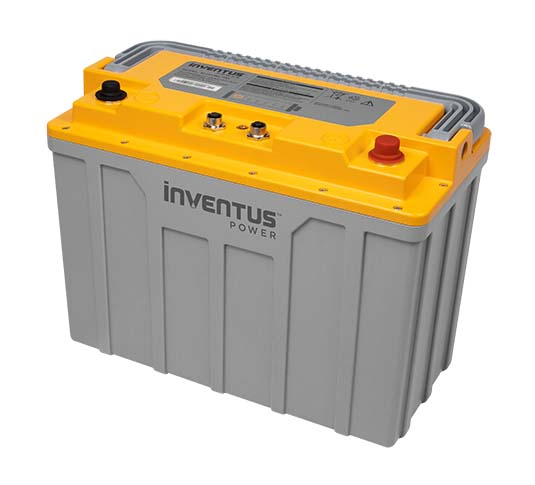Your shopping cart is empty.
Scheduled site maintenance will begin on Friday, March 27 at 7:00 PM CT and is expected to last several hours. During this time, some site functionality may be unavailable.
Realizing the Potential of Lithium-Ion Battery Technology
The world of facility cleaning operates on tight budgets and tight margins, where even small gains in operational efficiency can drive serious bottom-line savings and significant competitive advantages. Veterans in the industry — from facility managers to building service contractors — are always on the lookout for new tools and technologies that can give them an edge. But they know they can’t afford to take a chance on unproven technology — and they also can’t afford to make big investments that don’t deliver immediate value.
That’s why lithium-ion (li-ion) battery technology has garnered such widespread interest and intrigue in the facility cleaning industry. Already proven in various applications from automobiles to cell phones, li-ion batteries have immense potential as a new power source for floor cleaning machines. They provide immediate and significant gains from higher runtime and productivity as well as lower operating costs and a reduction in cost-of-ownership over time.
Many questions and misconceptions still surround this rapidly growing technology. But as more and more cleaning fleets make the switch to li-ion technology, they’re delivering real-world proof of the comparative advantages — as well as shaping a set of best practices that guide buying decisions toward maximizing the advantages of switching to li-ion technology.
Expanding Applications for Li-Ion Technology
Experts expect li-ion technology to continue rapid expansion. The global li-ion market is expected to grow more than 11% annually over the next five years1 , led by several key industries:
- Auto manufacturers: Many of the most advanced hybrid vehicles today use li-ion battery technology. Moreover, these li-ion-powered vehicles continue to grow in popularity among consumers that value the eco-friendly advantages.
- Golf carts and ATVs: Li-ion batteries are replacing lead-acid batteries in golf carts and off-road vehicle markets. Commercial owners of these vehicles increasingly recognize that switching to li-ion batteries can reduce labor and maintenance costs while increasing their vehicles’ uptime.
- Public transportation: Municipalities are starting to convert their busses to Li-on power sources — lowering maintenance costs and reducing their environmental impacts.
- Material handling: Industrial and commercial warehousing operations increasingly use forklifts and pallet jacks powered by li-ion technology. In fact, by 2028, nearly half of all electric fork trucks will be powered by lithium-ion batteries2.
- Floor care: Multiple manufacturers of floor care machines now offer scrubbers and sweepers powered by li-ion technology.
1 Lithium Ion Battery Market Value to Hit $73 Billion by 2025: Global Market Insights, Inc., https://www.prnewswire.com/news-releases/lithium-ion-battery-market-value-to-hit-73-billion-by-2025-global-market-insights-inc-300879782.html
2 Global Forklift Market - 2020, https://www.interactanalysis.com/the-global-forklift-market-2020/
Understanding the Real World Benefits of Li-Ion Technology
Li-ion technology differs at a fundamental level from the traditional battery technologies (i.e., lead-acid) used in floor care equipment — and obviously, is an entirely different category of power source from liquid fuels (propane, diesel or gas). However, for most fleet managers, diving into the technical details of how the li-ion battery works is less important than understanding how the unique qualities of li-ion battery technology deliver specific advantages when used in floor care equipment*:

Higher Performance
The high energy density of li-ion batteries delivers longer machine runtime — increasing runtime by as much as 60%.

Greater Efficiency
Because li-ion batteries do not require over-charging to mix the electrolyte, they use significantly less electricity during charging — and charge up to 40% faster than lead-acid batteries.

Longer Life
Leading 36V li-ion batteries deliver up to a 2,000 charge cycle lifespan and 24V li-ion batteries deliver up to a 4,000 charge cycle lifespan, providing additional years of operational use as compared to traditional batteries.

Zero Maintenance
A battery-powered fleet eliminates tedious engine maintenance and fuel storage issues. But li-ion batteries completely upend traditional battery-management protocol by doing away with battery watering and other battery maintenance. They are also designed to enable opportunity charging. Unlike lead-acid batteries, opportunity charging does not damage or reduce the life of lithium-ion batteries.

Safer Operations
Li-ion batteries ensure operators are not exposed to hazardous battery acid or fumes produced while charging lead-acid batteries. And of course, a li-ion-powered fleet is emissions-free and eliminates the need to store flammable fuels onsite.

*Statistics based on average Tennant lithium-ion battery offering
The Comparative Advantages of Li-Ion Technology
For many fleet managers, the biggest barrier to making the change to li-ion technology is the change itself. Concerns about the pain managing the change gives the status quo greater appeal. However, a direct comparison of li-ion technology to traditional power sources reveals significant comparative advantages that compel forward-thinking leaders to make the investment and start the change.
Lithium-Ion vs. Liquid Fuel (LPG, Diesel, Gas)
- Uptime: The extended runtime of a li-ion battery enables full-shift cleaning without requiring operators to stop to fill or change a liquid fuel tank.
- Cost: Li-ion batteries eliminate engine maintenance costs, as well as fuel and fuel storage costs. Operator costs are reduced by eliminating battery watering.
- Safety: Li-ion-powered machines operate at significantly lower dBa sound levels enabling operators to be more aware of their surroundings, and they are emissions-free, improving indoor air quality. Eliminating the storage of flammable liquid fuels onsite delivers safety benefits to all users of the facility.
- Sustainability: Switching to li-ion batteries eliminates reliance on non-renewable natural resources, while reducing carbon emissions.
Lithium-Ion vs. Lead-Acid Batteries
- Uptime: Li-ion batteries charge up to 40% faster than lead-acid batteries and deliver up to a 60% improvement in machine runtime. Fully-enabled opportunity charging further ensures that machines are always charged and ready to clean.
- Cost: Eliminating battery watering and enabling opportunity charging delivers significant operational cost savings. With a 2,000 (36V) - 4,000 (24V) charge cycle lifespan, li-ion batteries reduce replacement cost of multiple batteries.
- Safety: Li-ion batteries eliminate the risk of operators encountering battery acid, and do not produce potentially harmful gases during charging like lead-acid batteries.
- Operator Training: By eliminating all battery maintenance and enabling opportunity charging, li-ion batteries greatly simplify operator training and reduce the risk of operator misuse and abuse.
*Statistics based on average Tennant lithium-ion battery offering
Emerging Best Practices Guide for Li-Ion Buyers
While the facility cleaning and floor care industries are just beginning to explore the potential of li-ion technology, there is no shortage of options for would-be buyers. Several manufacturers of floor care equipment now offer machines powered by — or are compatible with — li-ion technology. In addition, third-party battery vendors offer li-ion batteries that can be used within compatible machines.
Fortunately, as li-ion technology begins to gain traction as a high-value power source in the facility cleaning industry, a set of best practices have emerged to guide buyers as they consider multiple vendors and differing approaches.
Choose Fully Integrated Li-Ion Technology
As mentioned, retrofitting existing floor care equipment with third-party li-ion batteries is an option. However, the shortcomings of choosing a non-integrated, third-party li-ion battery limit performance gains, can damage equipment and can even create operator safety risks.
For example, many third-party li-ion batteries feature a battery discharge indicator (BDI) on the battery itself (though it should also be noted that some do not feature a BDI at all), where it is not clearly visible to the operator during cleaning. This requires the operator to stop working to check the BDI — or risk being stranded if the battery runs out of power away from a charging area. Moreover, a non-integrated third-party battery should not be expected to communicate with the machine. This could lead to unsafe operating conditions that, again, damage equipment and put operators at risk.
Industry-leading manufacturers design their li-ion batteries to be fully integrated with their machines where the battery management system (BMS) and cell module work as a single cohesive system. Choosing a fully integrated li-ion battery solution delivers several benefits:

Maximized Runtime
By designing the li-ion battery specifically to fit into the machine and properly mate up with the machines unique electrical operating system, fully integrated lithium-ion batteries maximize runtime

Integrated Battery Management System (BMS)
A fully integrated battery is an intelligent system where the BMS ensures continuous, real-time communications between the battery and the machine. A fully integrated BMS protects the user and equipment from unsafe operating conditions, automatically shutting off the machine if such conditions are identified.

Simplified Operation
A fully integrated battery enables the operator to turn the machine and battery on and off at the same time with the single machine key switch. Many non-integrated lithium-ion batteries require that the operator turns on the battery before starting the machine. Additionally, a non-integrated battery may have the battery discharge indicator (BDI) on the battery; whereas, an integrated battery allows the operator to constantly see the state of charge through the machine’s BDI. A clearly visible battery discharge indicator ensures that the operator can see real-time battery life without interrupting cleaning.

Warranty and Support
Using third-party batteries in existing cleaning equipment, can void the equipment manufacturer’s warranty. In the event of an issue, the fleet manager may be left bearing the entire cost of repair or replacement. Moreover, a supplier of a fully integrated li-ion-powered system can deliver more reliable and evidence-based service and support, based on their comprehensive knowledge and experience with every component of the system. Choosing an integrated system with this level of warranty and support helps protect the investment of a lithium-ion power source.
Gaining the Competitive Advantage of a Future-Proof Cleaning Fleet
Though the core objectives of the facility cleaning industry have remained largely the same for decades, veterans know it’s anything but a status-quo business. Small changes can have major impacts on cleaning performance, operational efficiency and the overall health of the business. While major technology changes are few and far between, li-ion battery technology most certainly represents an innovation that stands to definitively transform the industry. Li-ion technology completely redefines standards for battery and machine performance – delivering significantly longer battery life that drives longer runtime, increased uptime and improved fleet performance. But li-ion technology benefits more than just the machines – li-ion batteries dramatically reduce the burdens for both machine operators and fleet managers. A true maintenance-free power source, li-ion batteries eliminate battery watering and fuel tank filling, while enabling opportunity charging. This frees operators to spend more time cleaning – and frees fleet managers from constant concerns about operator charging behaviors, battery life, fuel costs, battery acid exposure and more.
As li-ion technology rapidly spreads across all facets of life, forward-thinking fleet managers in the facility cleaning and floor care world can gain distinct performance advantages – and give their business definitive competitive advantages – by making the switch to li-ion-powered machines. Choosing lithium-ion batteries from a trusted source is critical to optimize performance, ensure operator safety and protect your investment.
For more information or to find out if li-ion technology may be right for you, contact us.


